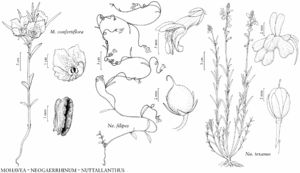Mohavea confertiflora
Muhlenbergia 8: 48. 1912.
Stems 5–60 cm, simple or branched. Leaves: blade linear to narrowly lanceolate, proximal sometimes elliptic, 20–65 × 3–15 mm. Pedicels 5–6 mm in flower, 6–16 mm in fruit. Flowers: calyx abaxial lobe 13–15 mm, adaxial and lateral lobes 10–13 mm; corolla pale-yellow to white, often marked with maroon, 25–35 mm, palate convex, yellow and spotted with maroon or maroon. Seeds 1.5–2 mm. 2n = 30.
Phenology: Flowering Mar–Apr.
Habitat: Desert, rocky slopes, washes.
Elevation: -40–1200 m.
Distribution
Ariz., Calif., Nev., Mexico (Baja California), Mexico (Sonora)
Discussion
The pale, maroon-spotted flowers of Mohavea confertiflora resemble those of Mentzelia involucrata, which sometimes grows nearby. Mentzelia flowers produce nectar, but Mohavea flowers do not; R. J. Little (1980) suggested that M. confertiflora flowers mimic Mentzelia to attract pollinators. Also, the maroon spots on the palate of M. confertiflora flowers are said to resemble the color and form of the abdomen of female Xeralictus bees as they are exposed when the females bury their heads in the Mentzelia flowers to collect nectar. Male Xeralictus bees often attempt to mate with the females at these times, and they have been observed trying to mate with the palates of M. confertiflora flowers as well (D. Yanega, http://entmuseum.ucr.edu/bug_spotlight/posted%20Images-pages/33.htm).
L. C. Hileman et al. (2003) found that the symmetry of the adaxial corolla lip and the abortion of the lateral and adaxial stamens, characteristics that distinguish the genus, were controlled by regulation of the expression of two genes. They suggested that these changes are adaptations to the pollination of this species.
Selected References
None.
